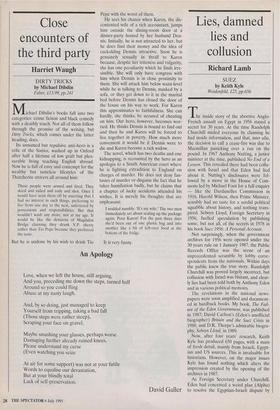Close encounters of the third party
Harriet Waugh
DIRTY TRICKS by Michael Dibdin Faber, £13.99, pp.241 Michael Dibdin's books fall into two categories: crime fiction and black comedy with a deathly touch. Not all of them follow through the promise of the writing, but Dirty Tricks, which comes under the latter heading, does.
Its unnamed but repulsive anti-hero is a relic of the Sixties, washed up in Oxford after half a lifetime of low graft but plea- surable living teaching English abroad. Now he is full of envy and contempt for the wealthy but tasteless lifestyles of the Thatcherite strivers all around him:
These people were armed and fired. They skied and sailed and rode and shot. Once I would have seen them off by asserting that I had no interest in such things, preferring to live from one day to the next, unfettered by possessions and responsibilities. But that wouldn't wash any more, not at my age. It would be like the denizens of Magdalen Bridge claiming they drank V.P. sherry rather than Tio Pepe because they preferred the taste.
But he is undone by his wish to drink Tio Pepe with the worst of them.
He sees his chance when Karen, the dis- contented wife of a rich accountant, jumps him outside the dining-room door at a dinner-party hosted by her husband Den- nis. Initially, he is not attracted to her, but he does find their money and the idea of cuckolding Dennis attractive. Soon he is genuinely sexually in thrall to Karen because, despite her triteness and vulgarity, she has one peculiarity which he finds irre- sistible. She will only have congress with him when Dennis is in close proximity to them. She will attack him below waist-level while he is talking to Dennis, masked by a sofa, or they get down to it in the marital bed before Dennis has closed the door of the house on his way to work. For Karen this approximates to faithfulness. She can hardly, she thinks, be accused of cheating on him. Our hero, however, becomes wor- ried. He thinks Dennis is bound to find out and then he and Karen will be forced to live together in poverty. How much more convenient it would be if Dennis were to die and Karen become a rich widow.
The novel, which has two deaths and one kidnapping, is recounted by the hero as an apologia to a South American court where he is fighting extradition to England on charges of murder. He does not deny fan- tasies of murder or disguise the fact that he takes humiliation badly, but he claims that a chapter of lucky accidents attended his wishes. It is merely his thoughts that are unpleasant:
I nodded numbly. 'It's my wife.' The two men immediately set about sealing up the package again. Poor Karen! For the past three days she'd been out of one plastic bag and into another like a bit of left-over food at the bottom of the fridge.
It is very funny.


















































 Previous page
Previous page